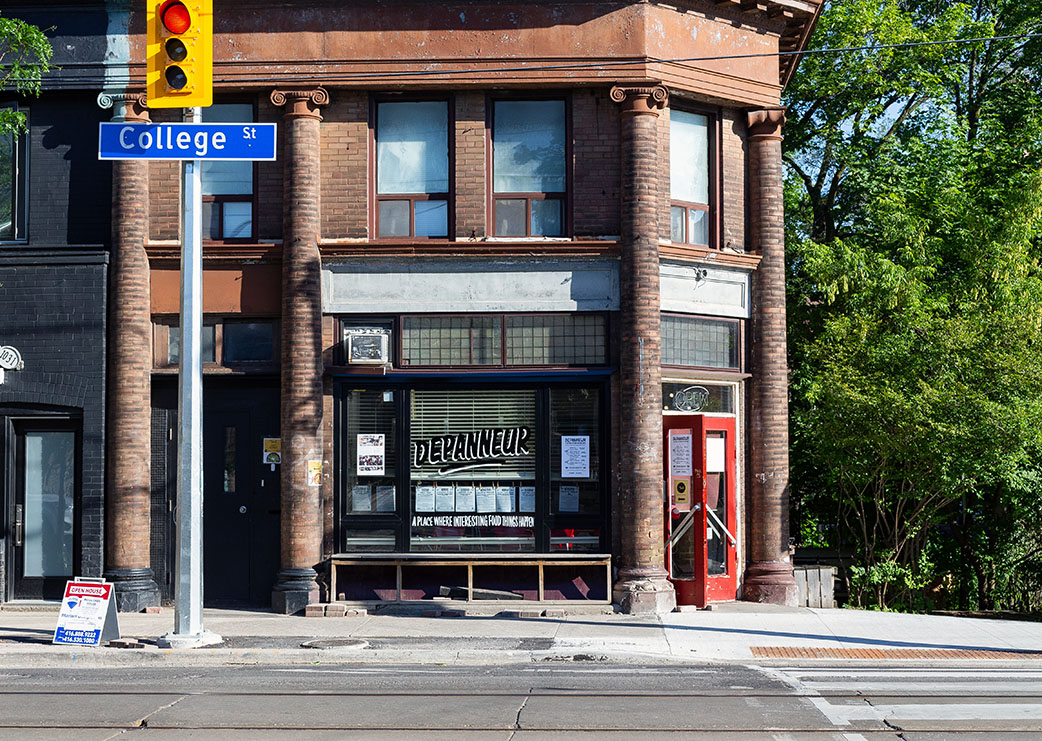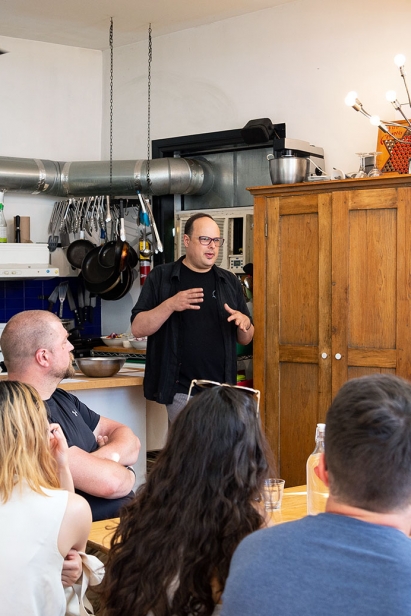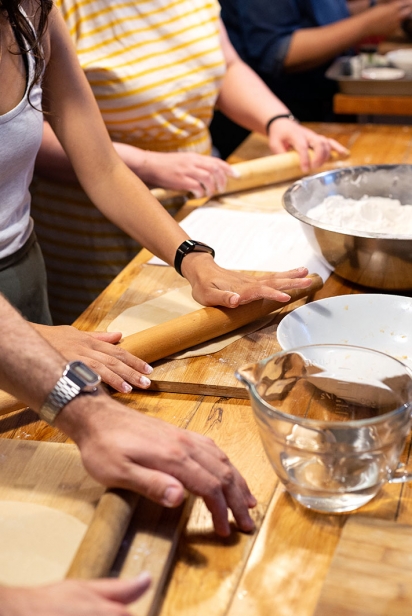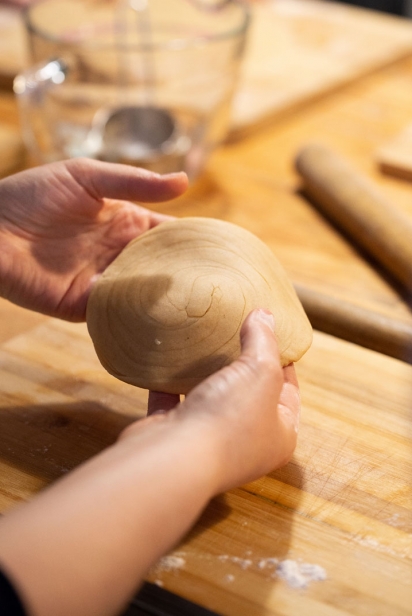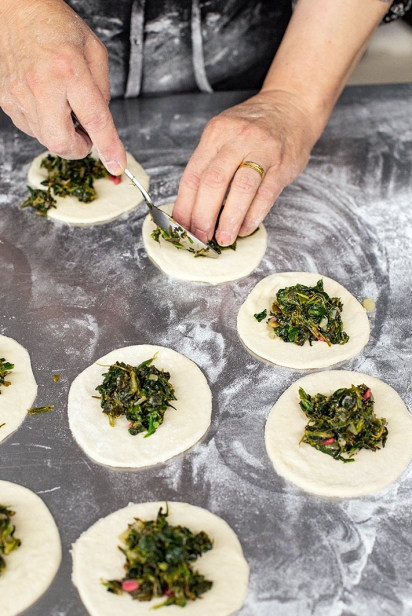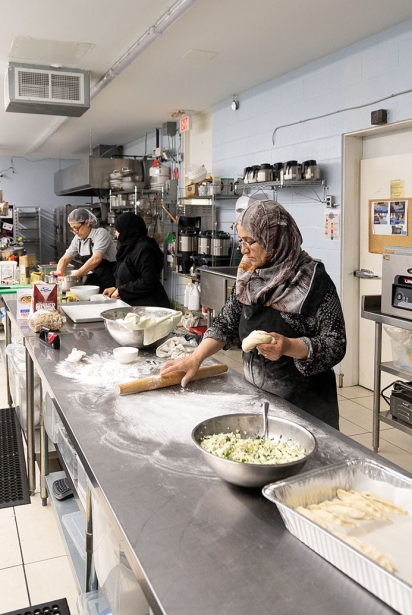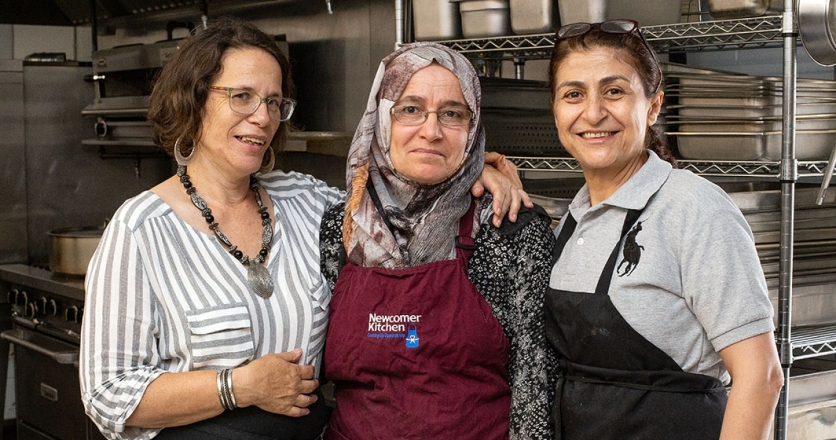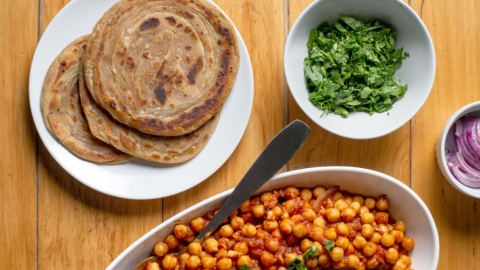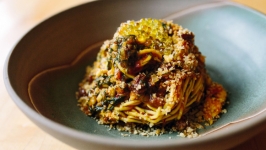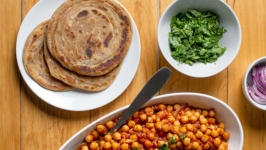Make Bread, Break Bread
Behind the distinctive red door of the Depanneur, the year is 1603. Diners tuck into Elizabethan chicken and prune pies — an eclectic mishmash of meat, cinnamon and rosewater. In the background, a food critic waxes poetic on the edible symbolism in Shakespeare’s plays.
On another night, the only living soba master in Canada rolls buckwheat dough in a near-spiritual trance — every movement intentional, every noodle yielding and precise. It’s an ineffable thing to behold, the journey from Manitoban buckwheat fields to red lacquer bowl to bamboo wicker plate. Plates emptied, the journey is complete.
At the Depanneur, approximately 300 such journeys take place every year. Len Senater, who founded the pop-up food venue in 2011, describes it as a place “where interesting food things happen” — a smorgasbord of events ranging from cooking classes to communal supper clubs and weekend brunch. Senater sees the space as a community-building hub for delving into the deeper meaning of food, but also as an antidote to the transactional nature of restaurant dining.
“The typical restaurant model does almost nothing to unpack what food is capable of,” he says. “So, this was a Venn diagram of everything I love about food, minus everything I don’t like about restaurants.”
It’s a decidedly democratic approach, with no separation between the kitchen and dining space. The layout is simple and recognizable — a space rendered accessible to the full spectrum of seasoned celebrity chefs and grandmothers alike. From its whirring fans to blue tiles and bright red chairs, the atmosphere remains unfussy and pleasant — not unlike attending a friend’s dinner party two hours early and promptly donning an apron.
Cooking classes at the Depanneur often unfold with this colloquial spirit in mind — an ease helped by the chefs themselves, many of whom first learned to thrive as home cooks before making a foray into the food industry. One such chef is Erika Araujo, whose demanding profession as a nurse in Mexico City kept her out of the kitchen. It wasn’t until she arrived in Canada that the inextricable bond linking food to identity began to crystallize. “When I immigrated, my family was so homesick that it pushed me to cook,” she says.
Araujo’s classes encompass staples of Mexican cuisine such as sopasand tlacoyos. In a class on salsas, she demonstrates how sauces are a kind of culinary lingua franca spoken across the highly regional cuisines of Mexico. To that end, Araujo hopes to dispense with the impersonal gentrification of Mexican food as overpriced Baja fish tacos. Her classes, like many offered by the Depanneur, are rooted in the complex generational histories of food.
Yet the generational histories contained in some cuisines are still in the process of being pioneered. For pastry chef Mel Boccia, time in the kitchen is less about traditional food ways manifested in childhood dinners, but rather about developing what that might look like in a vegan framework. The São Paolo native began cooking in earnest after becoming vegan in meat and dairy-centric Brazil. “You don’t have much help, you know. This lack of support is kind of very nebulous,” Boccia says. “You have to do it yourself.” It’s an entrepreneurial spirit befitting the show-and-tell style of a class on vegan ice creams, where Boccia and fellow chef Melanie Richard pass around scoops of lemon pineapple cardamom sorbet; toppings such as sunflower halva, macerated berries and pistachios sit tantalizingly off to the side. While the goal of the class is first and foremost to teach, Richard sees the Depanneur model as carte blanche to reconnect with what makes chefs passionate about food. “I like the independence, and basically what you’re able to do here,” she explains. “You get to explore your own in-depth qualities of what you have to offer.”
The rising popularity of cooking classes marks a shifting trend in consumerism — one that places value on experiences over material goods, but also speaks to society’s unprecedented interest in food as a whole. “Food itself is an incredibly powerful vector. It has this incredible superpower to leap across language and culture and gender and history — to connect people. To share in what is essentially one of the most fundamental of all human experiences,” Senater says. “There hasn’t ever been anyone who doesn’t eat.”
Perhaps no one understands that better than the Syrian women gathered around the Depanneur kitchen on Canada Day — operating the microcosm of spice cabinets and cookware with an ease and familiarity reminiscent of a family gathering. The act of instructing guests on how to craft the perfect mezze and plopping egg yolks into a lively shakshuka considers not only the grace with which they do it, but a more profound resemblance of who they are.
The women, after all, are part of Newcomer Kitchen — one of the Depanneur’s most recognized initiatives. The non-profit social enterprise took root in 2016 as a response to the first wave of Syrian refugee women in Toronto, many of whom had been living indefinitely in hotels without access to kitchens. Senater and Cara Benjamin-Pace, the non-profit’s co-founder, invited the women to take part in a weekly pop-up — the idea being that they could come and engage in the normalcy and dignity inherent in cooking, sell the meals they made and share in the proceeds.
The original pop-up model has taken new forms since then, from catering to global partnerships and everything in between. While its scope may change, the organization’s core remains unwaveringly human — a space where, Senater says, “we expand on the meaning, and that becomes the main course; the food itself is sort of the souvenir.”
That certainly seems to be the case in Newcomer Kitchen’s peer-to-peer workshops, which subvert the traditional cooking class model. Guests are asked to bring and teach recipes from their family backgrounds; they learn a related Syrian dish in turn. Chinese-Canadian schoolchildren make dumplings while the women impart the Syrian version, called shishbarak; an Italian-Canadian prepares pizza before learning how to make fatayer, a Middle Eastern meat pie. Benjamin-Pace believes it’s an opportunity to break bread — to share in the Canadian commonality of hyphenated identities. “We’re all refugees from our past. We are all newcomers to our present. And we are all immigrants to our future,” says Benjamin-Pace. “It’s a shared story. It’s a Canadian story.”
The sentiment is one to which Araujo can relate, as she fondly recalls the tableau of a Sunday dinner in Mexico City — family members passing along tinga and a hearty bowl of pozole. “I think any immigrant has the same feeling; you know. You feel like you’re missing so much,” she says. “Food always brings that connection with where you come from, and makes you feel like you’re home.”
At home, wherever it may be, food holds the genuine capacity to be transformative — a way to reframe conversations about identity and belonging. Whether it’s slathering up fresh parathas with ghee or crafting ravioli a-la-Nonna, one thing is certain at the Depanneur: Guests who walk through the door come with their bellies empty and leave with their hearts full.
The Depanneur
1033 College Street, Toronto, Ont.
thedepanneur.ca | 416.828.1990 | @thedepanneur


